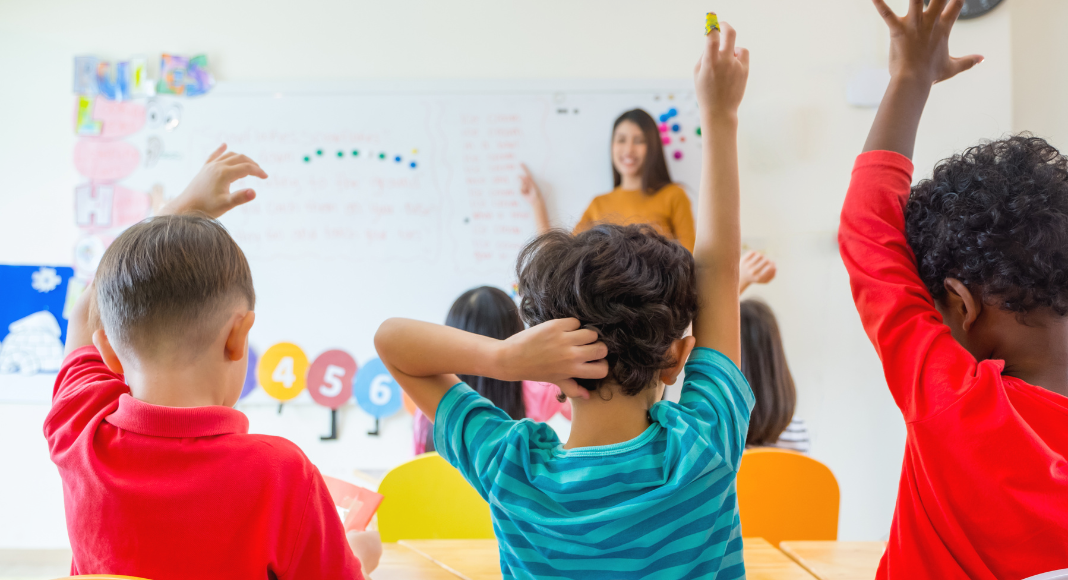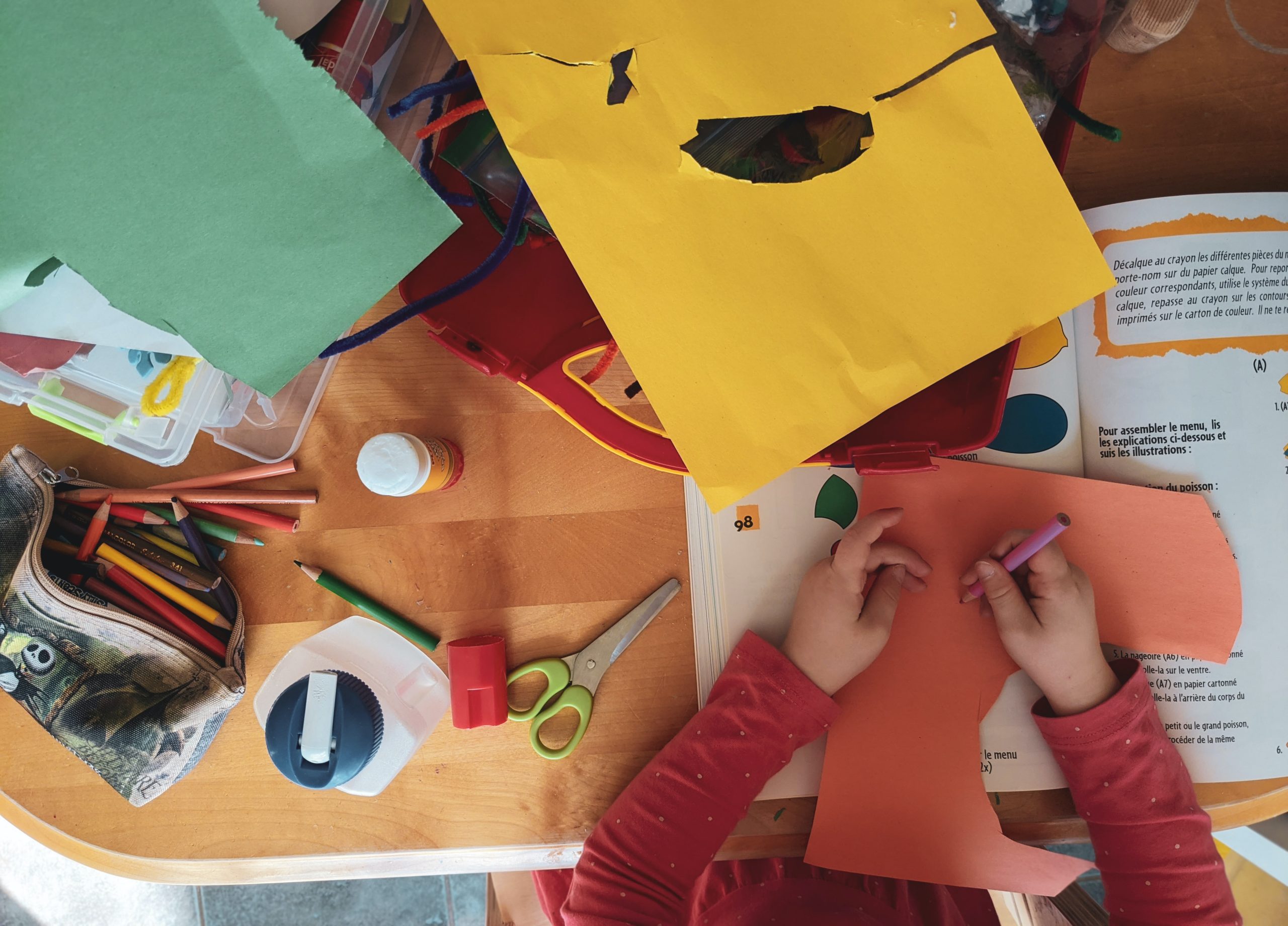Don’t worry, summer isn’t over quite yet! But, if you have a soon-to-be kindergartener, there are some things you and your child can work on before school does start in the fall.
If you haven’t had a school-aged child yet, it’s important to know that kindergarten is quite different than it was years ago. While there’s still plenty of time for play and fun, there’s also a lot of time dedicated to academic learning. Students are encouraged to be independent and responsible.
 Kindergarten sets the stage for your child’s school career, and no one wants to start out behind. It’s a big transition for all, so to ensure that your child hits the ground running, here is a list of kindergarten readiness skills from a certified public school kindergarten teacher. There’s even a bonus at the end—a parent readiness checklist for you!
Kindergarten sets the stage for your child’s school career, and no one wants to start out behind. It’s a big transition for all, so to ensure that your child hits the ground running, here is a list of kindergarten readiness skills from a certified public school kindergarten teacher. There’s even a bonus at the end—a parent readiness checklist for you!
SELF-CARE SKILLS
Self-care skills are those things that we adults do every day, automatically. They are second nature to us, but our kids need explicit instruction in order to successfully care for their own needs.
Bathroom Needs
This one might seem obvious, but let me remind you of the not-so-obvious. Using the bathroom at home is a bit different than using it at school. When at school, remind your kiddo to close the door! Work on wiping independently (especially after number two). Students should not be afraid to flush and they need to know how to pull up their clothing afterward.
Bonus: teach your boys to wipe the seat if they dribble. And, teach your girls how to make sure their dress isn’t stuck in their undies!
Blowing Their Nose
This is a big one for kindergarten readiness! With school comes germs. The boogers come and never seem to go. Kids should be able to blow their nose and wipe it independently. No nose picking! The book Blow Your Nose, Big Bad Wolf is great for teaching this.
Cleaning Up
Spills and crumbs are inevitable with little ones. Prepare your kiddo by talking about how to clean up water spills, how to handle crumbs on the table, and remind them to throw away their garbage. The book Curious George Cleans Up is a silly story with a great segue into these topics.
Clothing Needs
It’s okay if your child can’t yet zip, snap, or tie 100% of the time. However, please be conscious of this when getting them dressed for school. If your child can’t snap buttons yet, putting them in jeans might not be the best idea.
The same rule applies to tennis shoes; we don’t expect kindergarteners to be able to tie their own shoes, but we also don’t want to tie 28 pairs of shoes three times a day. Stick to easy shoes for your kiddo whenever possible.
Zipping is another task you and your child should practice this summer. And, kindergarteners should be able to take off and put on sweaters or coats independently. This one often isn’t thought of, but it’s a helpful thing to know! Practice taking a sweatshirt off and if the sleeves are inside out, teach your child how to get them back the right way.
Lunch Time Needs
Raise your hand if your little rascals get up fourteen times during lunch and take an hour to eat! (Mine!) Well, in school, kids have about 25 minutes to eat. This summer, set a timer and have your little one practice staying in their seat and eating the entire time. Additionally, your child is ready for kindergarten if they can unzip their own lunchbox, open containers and packages, and zip up plastic bags.
Washing Hands
Practice using the appropriate amount of soap and paper towel, not playing in the water, and turning it off when done.
SOCIAL SKILLS
Social skills are the ability to get along with others. Students will encounter children and adults with many different personalities and rules. Starting kindergarten with a strong sense of speaking and listening will set your child up for success.
Attention Span
Your new kindergartener should be able to sit and listen to an adult-directed activity for approximately 5-10 minutes.
Expressing Wants/Needs
Kindergarten kiddos should be able to clearly and calmly express themselves. For example: “I need a blue crayon please.”
Following 2- to 3-Step Directions
For example: push in your chair, get your coat, and line up.
Sharing + Taking Turns
This is another obvious one, but it takes a lot of practice and role playing. Model asking your child, “Can I play with you?” or “Can I have a turn when you’re done?” Read the book Can I Play Too? by Mo Willems together.
Speaking in Complete Sentences
Instead of just, “pencil,” children should be saying, “I don’t have a pencil.”
Waiting Patiently
The majority of kindergarten classes have one teacher for 25-30 students. Patience is a must. Help your child practice waiting quietly without interrupting, such as when you’re having a conversation with another adult.
EMOTIONAL REGULATION SKILLS
Emotional regulation is an essential life skill and an important part of kindergarten readiness. It’s the ability to recognize your emotions whilst also expressing them appropriately. This is an ongoing learning process, but students should have the basics when entering kindergarten.
Accepting Losing
Be sure to play lots of games at home this summer, and don’t always let your child win. Coping with loss is an important skill and knowing how to manage this before starting school will be very beneficial. Kindergarten is full of fun and games!
Controlling Strong Emotions
It’s expected that five-year-olds will have big feelings in school. At this age, students should be able to manage those emotions the majority of the time. They aren’t ready for kindergarten if they are having tantrums, throwing objects, or being physical when upset. The book Millie Fierce by Jane Manning is a great way to start this discussion with your little one.
Expressing Feelings
If upset, students should be able to explain why or what happened.
Separating from Parents
The first days of school are rough on everyone! If your child (or you!) cry at drop-off the first week, don’t fret. That’s normal. However, it shouldn’t be a daily occurrence. If your kiddo can calm down quickly once class starts, they are ready for kindergarten! There are a plethora of books to read to help prepare your child for this transition without you. One of my favorites is Clifford Goes to Kindergarten.
Solving Minor Problems
For example: what to do when there are wood chips in their shoes.
ACADEMIC SKILLS
When you hear kindergarten readiness, academic skills are probably what you think about. For kindergarteners, this is mainly a combination of alphabetic principles, number sense, and fine motor skills.
Alphabet
By the time they enter kindergarten, students should know the ABC song. It is wonderful if your child recognizes some uppercase and lowercase letters, too.
If your child is struggling with letter recognition, start by just recognizing the letters in their name. When you’re out and about, be sure to point out letters, too. For example: the McDonald’s M or the letters on street signs when you’re on a walk.
Art
By the age of five, children should know the basic colors and shapes. They should also be familiar with what is acceptable to color, cut, and glue.
Fine Motor
Children will continue to develop and strengthen their fine motor skills throughout the year. Before starting school, work with your child on correct pencil grip. They should not hold a writing utensil with their fist anymore; if you notice this, correct it every time. Grips are a habit, and it is harder to correct later on down the road.
I encourage you to allow your child to experiment with kid-safe scissors, again correcting the grip when necessary. Children should also have prior experience with tracing, coloring, and putting the tops on markers and glue sticks.
Name
For many, kindergarten is their first exposure to a school setting. There are names everywhere: desks, cubbies, folders, book bags, etc. It is essential that incoming kindergarteners are able to recognize their first name. When asked orally, they should be able to verbalize their first and last name, along with their age.
Numbers
Entering kindergarteners should be able to count to 20 and recognize a handful of numbers 0-10. It’s expected that they can use one-to-one correspondence when counting a small number of items in a set.
PARENT READINESS + RESPONSIBILITY
You may be excited to have more time to yourself now that your little one is going to be at school full-time. However, when it comes to kindergarten readiness, there are some responsibilities you will have now, too! Parents/guardians play a huge role in a child’s success. Being informed and involved with your child’s education is the best thing you can do.
Ask Questions
One of the best things you can do is talk to your child about his/her day! If you want to avoid the dreaded “I don’t know” response when you inquire, make your questions specific. Here are some examples: What book did the teacher read today? Who did you play with at recess? Was there a song you sang today?
Be Prepared for Tired Kids
The first month of kindergarten is exhausting! Those little loves are listening, learning, growing, connecting, and playing nonstop all day. Give them a break when they get home. Just like we adults enjoy relaxing after a long day, so do our kiddos.
Can Separate From Child
Easier said than done, I know! But, your child needs to know that you are okay so that they know they will be okay. You can totally cry once you’re out of eyesight!
Check Backpack Daily
You never know what you’re going to find in there! Hopefully you just see their folder full of fantastic work, but you’ll want to keep an eye out for spilled snacks, mysterious toys, library books, and possibly even a bundle of dandelions.
Label Everything
By October, the lost-and-found area looks like a full-on thrift store. Kids leave their coats on the playground never to be seen again. Unless . . . it has their name on it. Label it all: jackets, backpacks, lunch boxes and containers, school supplies, water bottles, winter gear. If you want it back, label it.
Bonus: seeing their name on everything will help your child recognize and spell it!
Read E-mails/Messages
With today’s technology, teachers and parents can stay connected easily. It’s often easier (and more eco-friendly) to send home an electronic note rather than a paper one, so be sure to read your e-mail daily.
Set a Routine
Children thrive on structure and routine. They need consistency and need to know what to expect. If you want to alleviate battles and meltdowns, as a family, create a routine for the evenings and mornings. A smooth morning at home translates to a smooth day at school!
Take some time this month to work on kindergarten readiness with your child. Remember that kindergarten readiness is not all about academics, but rather a slew of social and emotional skills that will foster your child’s independence for years to come. I know that kindergarten will be an amazing experience for you and your child!











